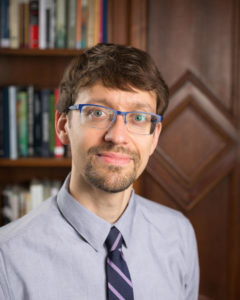January 31: Patrick Jagoda, “Videogames as Experimental Method”
Wednesday, January 31, 4:10 pm
Center for Digital Humanities, 344 Buttrick Hall
Patrick Jagoda

Patrick Jagoda is Associate Professor of English and Cinema & Media Studies at the University of Chicago. He is also a co-editor of Critical Inquiry and co-founder of both the Game Changer Chicago Design Lab and the Transmedia Story Lab. Most recently, he is the author of Network Aesthetics (University of Chicago Press 2016), a comparative media analysis of “critical and even transformative engagement with the network as a dominant category of life since the mid-twentieth century,” and co-author with Michael Maizels of The Game Worlds of Jason Rohrer (MIT Press 2016).
Videogames as Experimental Method
Gamification, a term that derives from behavioral economics, is the use of game mechanics in traditionally non-game activities. This buzzword emerged only in the twenty-first century but the idea of game-based behavior modification already appears as early as the 1950s in writing on business, marketing, psychology, and warfare. Numerous adopters of gamification across different fields regularly proclaim it to be an unparalleled organizational technique. Arguably, gamification is not merely a generalizable game design strategy that can be applied to areas such as education but also as a form that economic, social, and cultural life takes in the world of the early twenty-first century.
This talk approaches the worldview of gamification through the experimental nature of videogames. Instead of pursuing a merely taxonomic account of experimental games as a marketing category, subgenre, or loose formal orientation, the talk takes seriously the fundamental question: What exactly does it mean for games to be designated as operationally “experimental”? Drawing from the history of gamification and videogame aesthetics, Jagoda argues that games in the early twenty-first century should be conceived as not merely objects, forms, or activities, but as nothing less than a unique mode of experimental thought and learning.